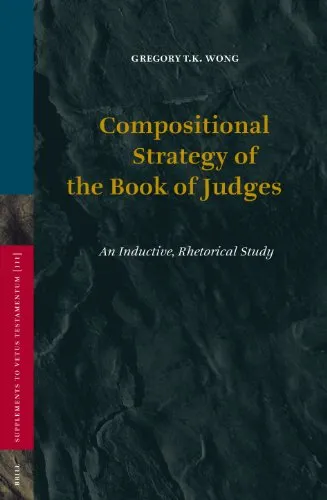Compositional Strategy of the Book of Judges (Supplements to Vetus Testamentum)
4.8
Reviews from our users

You Can Ask your questions from this book's AI after Login
Each download or ask from book AI costs 2 points. To earn more free points, please visit the Points Guide Page and complete some valuable actions.Introduction to "Compositional Strategy of the Book of Judges"
The "Compositional Strategy of the Book of Judges" is a critical exploration of one of the Old Testament's most complex texts. With a keen scholarly eye, it dissects the intricate literary and theological compositions within the Book of Judges, employed by ancient editors to convey profound messages. This book is a heartening compass for academics, theologians, and enthusiasts of biblical literature, aimed at unravelling the sophisticated strategies behind the narrative's arrangement.
Detailed Summary of the Book
The work undertakes a rigorous analysis of the Book of Judges, a canonical text situated between the conquest narratives of Joshua and the establishment of monarchy in Samuel. It argues that the Book of Judges is not a chaotic collection of tribal stories but a carefully crafted narrative aimed at conveying theological insights about Israel's identity, leadership, and relationship with God.
The initial chapters delve into the historical and cultural context of the Judges, setting a foundation for further study. Subsequent sections focus on individual judges, such as Deborah, Gideon, and Samson, revealing structural patterns and literary designs that contribute to the overarching narrative. The book discusses the cyclic pattern featured prominently in Judges, characterized by Israel's sin, oppression by enemies, supplication, and subsequent deliverance, emphasizing its compositional significance.
Moreover, it explores the redactional layering, identifying diverse sources and editorial insertions that reflect evolving theological concerns. By examining these, the book proposes a more nuanced understanding of the text's compilation and its intended message.
Key Takeaways
- The Book of Judges is a literary unity with a specific compositional strategy rather than a random collection of stories.
- The cyclical pattern of sin and deliverance serves as a theological framework for understanding Israel's history and divine interaction.
- The narrative reflects a complex editorial process, pointing to multiple layers of redaction that aim to address changing theological perspectives.
- The role of individual judges is intricately tied to Israel's identity and societal challenges, portraying varied leadership models.
Famous Quotes from the Book
"The cyclical pattern in Judges is neither accidental nor merely repetitive; it is an eloquent theological argument for divine fidelity and human folly."
"Judges is an artful tapestry, woven with ancient stories and theological reflections, inviting readers to discern the divine amidst human chaos."
Why This Book Matters
This book holds substantial significance for both academic and religious communities. It challenges simplistic readings of the Book of Judges and invites readers to appreciate the text's complexity and sophistication. By uncovering the compositional strategy behind the narratives, it opens the door to richer theological debate and reflection, offering insights into issues of leadership, faith, and divine justice that are as relevant today as they were in antiquity.
Additionally, the book contributes to the broader field of biblical studies by integrating literary criticism with historical analysis, appealing to those interested in the intersections of literature, culture, and religion. It stands as a crucial reference for anyone seeking to deepen their understanding of the ancient world and its sacred texts.
Free Direct Download
You Can Download this book after Login
Accessing books through legal platforms and public libraries not only supports the rights of authors and publishers but also contributes to the sustainability of reading culture. Before downloading, please take a moment to consider these options.
Find this book on other platforms:
WorldCat helps you find books in libraries worldwide.
See ratings, reviews, and discussions on Goodreads.
Find and buy rare or used books on AbeBooks.


